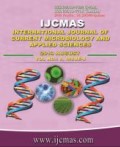


 National Academy of Agricultural Sciences (NAAS)
National Academy of Agricultural Sciences (NAAS)

|
PRINT ISSN : 2319-7692
Online ISSN : 2319-7706 Issues : 12 per year Publisher : Excellent Publishers Email : editorijcmas@gmail.com / submit@ijcmas.com Editor-in-chief: Dr.M.Prakash Index Copernicus ICV 2018: 95.39 NAAS RATING 2020: 5.38 |
Diverse communities of beneficial plant growth promoting diazotrophs harbour in Rice rhizosphere which mostly plays a significant role in supplementing Biofertilizer, bioprotectant and bio stimulator and improves the crop productivity directly or indirectly. 53 rhizobacterial were isolated from lowland rice rhizosphere of Jorhat district of Assam in non-selective TSA media. 30 pure culture isolates were grown in selective media to and selected five phosphate solubilizers, three Azospirillum, one Azotobacter and one Pseudomonas for screening multiple PGP traits both qualitative and quantitatively. All the selected cultures produced ammonia but Proteolytic activity was limited to few cultures. The test cultures enhanced seed germination ranging from 60-100%, IAA production from 15.8 to 22.6 mg l-1 and P-solubilization from 0.3-3.1 percent. The results also indicated direct relationship of drop in pH (6.57 to 4.01) to extent of P-solubilized with days of incubation. A Pot culture experiment was conducted during November, 2016 to evaluate 7 screened cultures of PGP on growth characters of brinjal (Solanum melongena) and post-harvest parameters. Among the test PGPR, culture P 20 (Azospirillium) recorded significantly highest percent increase in root length (21.6%), plant height (40.6%), root dry weight (120.6%), shoot dry weight (84.82%), total biomass (86.86%), root shoot ratio (19.45%), number of leaves (144.4%) and number of branches (200%) over uninoculated control. On post-harvest parameters, the microbial population was evaluated ranged from 1.7 to 3.5 cfu 106ml-1, dehydrogenase activity ranged from 107.2 to 140.4 µg TPF g-1, hydrolysis of Fluorescein diacetate ranged from 64.1 to 80.4 µg FDA g-1 hr -1 and phosphomonoesterase activity ranged from 75.0 to 94.2 µg p-nitrophenol g-1 h-1. Azospirillium (P 20) and Phosphate Solubilizing Bacteria (P 49) suggest to be the most efficient biofertilizers, biopesticide and biostimulator properties.
 |
 |
 |
 |
 |